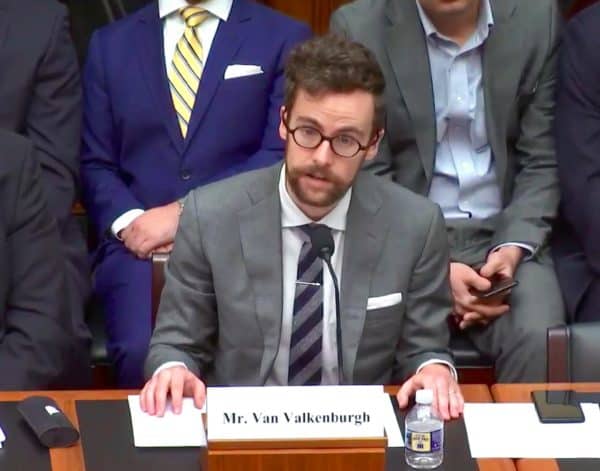Peter Van Valkenburgh, the Director of Research at Coin Center, a leading non-profit entity focused on the latest policy issues facing digital currencies, notes that during the past few years we’ve seen countries like Switzerland, Singapore, and the Netherlands adopt a technology-focused approach to regulating transactions involving “unhosted” cryptocurrency wallets.
Valkenburgh confirmed that the Financial Action Task Force (FATF) identified (potential) future measures in order to address peer to peer (P2P) transactions, which includes the possibility of banning or restricting access to certain wallets.
Valkenburgh pointed out these proposals have been “in the air” throughout this year. As US lawmakers keep reviewing various options with respect to cryptocurrencies and anti-money laundering (AML) regulations, these types of proposals are on the table.
According to the Coin Center Research Director:
“Those options are bad. They are drags on innovation, they unnecessarily limit the rights of citizens, and they are not technology neutral. Fortunately, these are not the policies proposed by the Treasury today. However, there are issues with this proposal, it’s rushed and has complicated new counterparty identification requirements that may be infeasible and innovation-killing in the context of cryptocurrency networks.”
He confirmed that Coin Center “strongly” prefers that no changes be made to the “currency state” of AML policy. He added that the organization is “gratified” that the United States hasn’t decided to repeat the same mistakes made by other governments. Instead, American policymakers have mainly suggested “an extension of rules that already apply to traditional financial institutions dealing in cash, albeit with complications,” Valkenburgh claims.
He added:
“The proposal announced [on December 18, 2020] is that transactions from regulated exchanges to individual wallets not subject to regulation (as well as unregulated foreign exchanges) should be subject to an existing automatic reporting requirement: Currency Transaction Reports (CTR) for cash transactions.”
Valkenburgh continued:
“CTRs are a form of warrantless search and seizure of private financial records. Fifty years ago, the Supreme Court narrowly upheld the constitutionality of these reporting requirements, arguing that Americans lose their right to a warrant with individual suspicion when they hand their private information over to third parties.”
Valkenburgh further noted that CTRs have been required for financial institutions and other service providers since the 1970s each time a client withdraws large amounts of funds or “cash-like” instruments. Bitcoin and other virtual currencies are “best analogized to electronic cash, and therefore applying these same reporting requirements to cryptocurrency withdrawals has, at least, the benefit of technological neutrality and parity with longstanding obligations placed on traditional financial institutions,” Valkenburgh argues.
He further noted:
“If a report is required when I take $10,000 in cash from my bank and put it in a suitcase, then it’s not unreasonable that a similar report would be required when I move $10,000 from my cryptocurrency exchange and put it into my hardware wallet. … And unlike the options listed by the FATF, this approach does not ban or otherwise limit citizens’ rights to hold their own crypto.”
According to Valkenburgh, the current proposal is “problematic” because it recommends new counterparty recordkeeping requirements for transactions valued at more than $3,000 and “satisfying those recordkeeping requirements could be infeasible in the context of cryptocurrency transactions,” Valkenburgh claims.
He also mentions that the current proposal is complicated and could create issues because it’s being “rushed.” He further noted that the Administrative Conference of the United States has suggested that comment periods for proposed regulations be 30 days, and 60 days for more “significant” ones ( as this one is “likely to be”). But this rulemaking “affords only 15 days, which is highly unusual and contrary to the spirit of the Administrative Procedures Act,” Valkenburgh argued.
He continued:
“While the proposed rule cites a ‘foreign affairs function’ exception to justify the short period, there is no actual account of why current policy is insufficient or why there is any urgency. And while FinCEN states that it has ‘engaged with the cryptocurrency industry on multiple occasions on the AML risks presented in the cryptocurrency space’ it has not sought public comment on this particular proposal.”
He further notes:
“What will happen in the next 15 days or so is the transition to a new administration. That may be the true motivation for rushing this rule. The time constraints of the so-called midnight period should never be an acceptable justification for imposing rules on Americans and innovative American businesses without sufficient opportunity for notice and comment.”
He concludes:
“We appreciate the fact that this proposal avoids technology-specific standards like the Swiss-rule and draconian restrictions like those FATF has contemplated. Nonetheless this rulemaking takes a bulk warrantless surveillance regime and applies it to an innovative technology with little opportunity for public comment. This is especially problematic given the complicated implications of the proposed recordkeeping requirements which may, as described in the next section, meaningfully stymie innovation.”
(Note: for more details on this issue from Coin Center, check here.)


